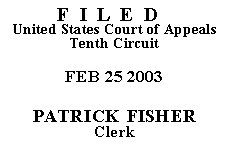

| UNITED STATES OF AMERICA,
Plaintiff- Appellee, |
(D. New Mexico) |
The defendant is aware that Title 18, United States Code, § 3742 affords a defendant the right to appeal the sentence imposed. Acknowledging that, the defendant knowingly waives the right to appeal any sentence within the applicable guideline range as determined by the court after resolution of any objections by either party to the presentence report to be prepared in this case, and the defendant specifically agrees not to appeal the determination of the court in resolving any contested sentencing factor. In other words, the defendant waives the right to appeal the sentence imposed in this case, except to the extent, if any, that the court may depart upwards from the applicable sentencing guideline range as determined by the court.
Rec. vol. I, doc. 51, at 4-5 (Plea Agreement filed Dec. 4, 2000). Following its acceptance of his guilty plea, the district court sentenced Mr. Martinez-Anaya to concurrent terms of 120 months' imprisonment on each conviction, followed by five years' supervised release.
Despite of the waiver-of-appeal provision in the plea agreement, Mr. Martinez-Anaya filed a notice of appeal. His appellate counsel subsequently filed a brief pursuant to Anders v. California, 386 U.S. 738 (1967), advising the court that in light of the plea agreement provision, Mr. Martinez-Anaya's appeal is frivolous. Mr. Martinez-Anaya's counsel has also filed a motion to withdraw. As required, see id. at 744, copies of the Anders brief and the motion to withdraw have been served upon Mr. Martinez-Anaya.
"A defendant's knowing and voluntary waiver of the statutory right to appeal his sentence is generally enforceable." United States v. Hernandez, 134 F.3d 1435, 1437 (10th Cir. 1998). There are exceptions to this general rule. For example, in spite of a waiver provision, a defendant may still appeal his sentence if the district court relied on an impermissible factor such as race, if ineffective assistance of counsel in connection with the negotiation of the waiver rendered the waiver invalid, if the sentence exceeds the statutory maximum, or if the waiver is otherwise unlawful. See United States v. Cockerham, 237 F.3d 1179, 1182 (10th Cir. 2001).
However, none of those exceptions applies here. Mr. Martinez-Anaya does not argue that his sentence was based on consideration of an impermissible factor, that he received ineffective assistance of counsel in the negotiation of the plea agreement, or that his sentence was otherwise unlawful. Additionally, the record indicates that Mr. Martinez-Anaya entered into the plea agreement knowingly and voluntarily.
Mr. Martinez-Anaya now contends that the district court erred in applying the statute (which requires a minimum sentence) and in calculating his criminal history. See Response to Motion to Dismiss for Lack of Jurisdiction at 2 (filed June 4, 2001). However, we discern no error in the application of the statutory minimum. The court found that the offense involved 22.75 kilograms of cocaine, see Rec. vol II, at 3 (Presentence Report, filed July 30, 2002), and therefore was bound to impose a sentence of no less than ten years. See 21 U.S.C. § 841(b)(1)(A)(ii); Rec. vol. II at 8 (noting that "[t]he term of imprisonment . . . is ten (10) years' minimum . . .[pursuant to] 21 U.S.C. § 841(b)(1)(A)). Moreover, because the sentence was within the Guideline range of 120 to 121 months, see id. at 8, ¶ 40, the waiver-of-appeal provision of the plea agreement precludes Mr. Martinez-Anaya from challenging the calculation of his criminal history.
Accordingly, we GRANT the motion to withdraw filed by Mr. Martinez-Anaya's counsel and we DISMISS this appeal.
Entered for the Court,
Robert H. Henry
Circuit Judge
*. This order and judgment is not binding precedent, except under the doctrines of res judicata, collateral estoppel, and law of the case. The court generally disfavors the citation of orders and judgments; nevertheless, an order and judgment may be cited under the terms and conditions of 10th Cir. R. 36.3.
2. After examining the briefs and the appellate record, this panel has determined unanimously that oral argument would not materially assist the determination of this appeal. See Fed. R. App. P. 34(a)(2); 10th Cir. R. 34.1(G). The case is therefore submitted without oral argument.